
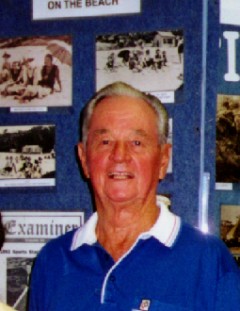 |

Eric Barclay Interviewee: Eric Barclay, born 19XX Interviewer: Port of Yamba Historical Society members Date of Interview: 20 April, 2001 Transcription: Marea Buist, 2001 |
Marjorie: Eric, I'd like you to start off by telling us where you came from.
I was born in Maclean in 1923 on the 16th November. The reason being Maclean was because there wasn't a hospital in Yamba and Mum I believe had a harrowing 3 ½ hour sulky journey to the hospital so that she could give birth to a delightful son. My mother, well my father first came to Yamba in the early rather the late 1800s from Batemans Bay where the Barclay clan were well known since they migrated out from Scotland. Mum came from Balmain in Sydney and married Dad in 1914 prior to him sailing for the First World War where he went through the major battles of France, was wounded in action and mentioned in dispatches. He came back to Yamba in 1918 after war concluded and he took up oyster farming which his brother Billy Barclay had done through those years anyway. So what I would like to do would be to just give a brief outline which I am sure you people will be familiar with when I look around the Historical Society here and see the photographs...
I suppose I can start in the year 1928. As a five year old you start to remember things, what went on. I was going to say we had an unique childhood here that we grew up in an era that without electricity. It was unique for us but not our parents, which I will cover shortly. I started school in 1929 because I didn't turn five until 28th November so I started in the January. That was the year that Mr Ford supplied the pine trees along Yamba Road which I was able to plant one of them I think as you know through the ceremony that took place a couple of years ago over here. But just getting back to my youth in those days, now I will start from Angourie Road because I haven't got the time to do it all. Angourie Road in those days was a dirt track and part of it was completely engulfed with foliage from the forests so that as kids we used to walk out to the pool and always made haste through that particular area, because I know at one stage Trevor (Phillips) had Gloria's (his sister) hand racing her through in case the boogie man got them.
The Bays, Pegus's Bay, Barclays' Bay and Blacks Bay as you know were apart from Pegus's there was land there that went into Barclays Bay was all open and we were able to swim the whole area through there. One of the delights we had as children was to going down into the Bay with a pickle bottle with bread in it and putting it out and catching the little bully mullet you know which to us a wonderful thing. I think most of us bird nested, much to some peoples horror, everybody had a shanghai. We used to swap eggs. The Bowling Club area, of course that was scrub where we had our cubby houses there. There was abundant wildlife, things that you never see today in the shape of hares and rabbits and wallabies, not so much the kangaroos, I mean they have been here all the time but the smaller animals and I might add snakes. There was a lot of death-adders here in Yamba. This was prior to the electric lights coming here which I've got noted somewhere that happened 1931 and that was really something.
For us it was a... you know, we had heard about it through people coming up from Sydney, I had cousins and nephews that came up here on holidays and I use to think we lived a pretty wonderful lifestyle until they started to tell us about the picture shows down there and the electricity and their refrigerators and so forth which we knew nothing about.
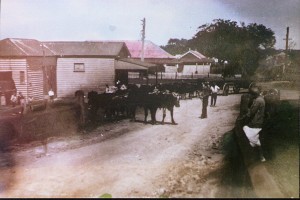 |
It was a hard time for our parents mainly I would say for the women, for the mothers who had to cook on an old fuel stove, who broke their backs over boiling coppers and using the old wash board. You know, things that we sort of didn't sort of appreciate when we were growing up and so that the electric light coming was a major thing in the lifestyle, in their lifestyle because instead of preparing lights every night, candles if the lights didn't work or if someone forgot to get kerosene or something. So it bought in refrigerators, freezers and all that type of thing, wireless which we just... I think Dad had an old crystal set that he use to listen to the test cricket and I think that was probably what... also prior to that we had talkies that use to come to Yamba, Penn's Traveling Talkies.
And as I got older I was able to walk around Yamba ringing the bell, you know "Penn's Traveling Talkies tonight". And you would go up on the hill and there was nothing there in those days but I use to get a free ticket into the movies which was you know pretty wonderful. And of course we had other things to, we had the School of Arts where they had community singing. I think it was once a month or something like that, which was pretty magic we thought as kids because you would go along there and all the old numbers that meant something not like these modern songs that they just repeat one word over and over. You know those songs had meaning and it was a social gathering for our parents. They were able to natter you know amongst each other. I am not sure that there was anything to eat afterwards, I don't think there was but I can't remember but it was an era where everybody left their doors open, there wasn't any problems. We had blacks here and they didn't you know invade our homes, we didn't invade their privacy. And as Trevor knows well we got on, didn't we, reasonably well, well I would say with them all.
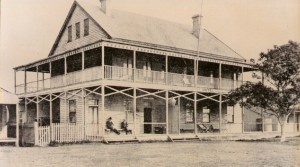 |
Of course then you get to the Christmas periods where the steamers use to come down that was on Easter too was another highlight with the four steamers coming down the river and tying up at the wharf. I read in "Yamba Yesterday" that, because I have been brushing up on it a bit, I knew there would be somebody here that would be able to say well that's not right, so that there use to be up to 1,500 people yeah, come off the steamers and I can quite believe that because I would be down there looking at all the ladies and guys dressed up in suits and so forth. And of course the Hotel was opposite, the Yamba Hotel and the men obviously used to fly into there and the ladies would make their way up to the hill and sit on the grassed area on the left hand side where Trev's father ... that was the focal point of Yamba, the hill, when we were growing up the flat was nothing. Everything was up on the hill. I think mainly because of the beach and mainly because of the services that were provided up there with what Trevor did and so forth.
And that hotel was burnt down in 1933 and I can vividly remember that because our old home is over here, one up from the Police Station in Bent Street. And Dad was fishing at the time and he was up probably around near Sleeper or somewhere there and we were woken up by the noise of the bottles, they were going off like bombs and we tore out into the yard and looked down and of course the whole thing was ablaze. And Dad spotted this and when you are that far away, he didn't have a clue, he knew that it was in Yamba, he thought that it could have been our place going up and you know there was a great panic to get back and the old launch was only do I don't know probably 5 knots or something like that, and yes, it wasn't until he got down more or less to the end of the wall that he knew that it was the hotel because of the size of the blaze and yeah as I said that was a pretty spectacular thing. The next morning we went down as kids because we knew that the tills would be counted and there would bound to be sixpencees and shillings... who was Scooter Evans was it or am I pre-dating you here.
Trevor replies: "Yeah, I can remember where the fire was later on, I know not only were you there but there was a lot of us that found a lot of sixpencees and we were disappointed as they were all fused together".
Well there the ones that was probably left because when we went down we were hunted off the property quick smart, they wouldn't let us anywhere near which was a bit of a disappointment. But just this while I am on hotels one thing that I would like clarify. I think the thing that should be rectified and that is the hotel at the Bowling Club what they have got on the board there, and there're got the Yamba Hotel is Black's Hotel and that's not right. Black's Hotel was never named Black's Hotel as you people probably know it was the Wooli Hotel and that is wrong and because people look at that and it has got the other thin... I spoke, when I was on the Board there to Laurie Goldman. Laurie was reluctant to change it and I have spoken to Hal Farlow. Hal is reluctant because it could offend Babsie (Ray Black) but I am surprised that Babsie let that go ahead because he was President when that went up there and it's not right, it should be corrected.
Stuart Lee: "That was a mistake on Keith Howland's part".
I don't know... yeah, well I don't know whether it was or not but as I said it could have been corrected because they knew that it wasn't right anyway that is beside the point.
The other thing to that I would just like to briefly mention is Stan Brown's Store which was the Post Office as well. Mrs Brown's mother use to make every Sunday cream horns and you know they were absolutely... they were homemade, the pastry was beautiful and the fresh whipped cream. It was usually out of you know our budget and I forget how much they were, they were probably only sixpence or it could have been... but those days I mean sixpence would buy a lot of money... a lot of stuff. Yeah, but I did manage to, by doing odd jobs for Stan I think, instead of being paid for it I used to barter and I would barter and go around there then hide from my brothers and sisters while I stuffed the cream horn which was no mean feat I can tell you because they knew damn well where I was going and they kept a pretty close tabs on me.
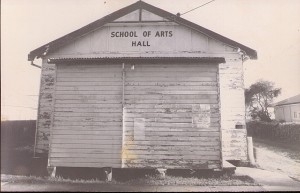 |
As you know Stan Brown played a major part well in the formation of the Bowling Green. When that was cleared. I use to work with old Mr Lattimer after school of an afternoon and I would be digging out the weeds with a carving fork and I would probable put in a couple of hours. I'm not sure but I think I got two shillings a week for that and that was really something. Yeah you could buy half a dozen licorice blocks for a penny and penny nestles yeah sixpence a packet cigarettes and I could go on forever. We didn't buy cigarettes because, I shouldn't say this but after the dances on at the School of Arts of a Saturday night, they held some pretty good dances there and of course the men... that was still all scrub there then, and they would have their bottles of beer and plonk and they would hide them in the bushes and we would go over and move them and of course the number of fights that caused. They accused one of their mates for knocking off their grog and we would sit back and see these terrific punch-ups. I am making a confession today.
Milva Lee: "It's on tape". So it is, I forgot about that, ah well you can erase that.
Trevor Phillips: I know we use to go down there on a Saturday night I know as kids we use to go down there to watch the fights everybody???Saturday night over where the first green was".
That right. And of course we did have some characters here. The Barber Shop was up on top of the hill and a chap by the name of Albert Olivera had it at this particular stage and we had a chap here by the name of Bondie (Doug Bond). Do you remember Bondie? And Albert Olivera was an excellent pug and he was almost a professional. So Bondie and him sort of had a hate love relationship and it was Saturday afternoon Doug use to go over to the Pub and get full and he would come back and pick Albert Olivera and he would say "go away I don't want to fight you", and I actually witnessed this and anyway in the finish he would thump him and he would go back over to the hotel and he would have a couple more beers and come back again but that same Bondie I struck at Milne Bay during the first campaign I was in so, I ran into quite a few of the local people overseas in the war, which I am branching off a bit. You said I could briefly cover these things. Reggie Law I ran into in Tarakan in the first landing in Borneo when we came out of New Guinea so you know Keith Black before he was killed at Sanana I was talking to Keith and we were going out as he was coming in. An hour later he copped it you know and as you know that is what the footprints at the cenotaph were about, his son.
Trevor: "Bondie was one of the Rats of Tobruk."
Yea, yea, yea and so while that pre-fighting he did obviously stood him in good stead.
Trevor: "That was nearly every Saturday nearly and I know he use to come home with... Dad and Mum would send him home and clean him up and he would go back again".
Can I interupt you ... Mr Buck?
Ah yes, Ron
Buck, Trevor would remember him, he was our Ag Teacher at Maclean High
and somehow or other I never sort of hit it off with Ron. I got that many
sixes off Mr Hunt through things I did wrong when he was taking our course.
So in 1942 when I first hit New Guinea who should I run into but Ron Buck??
And I happened to be a Corporal and he was a private so I said to him
"Hello, how are you".
And he said, he sort of made out that he didn't know me and I said, "Well
what do I call you". He said, "Well you're the Corporal and
I'm the Private so call me anything. Yeah, he didn't sort of give me the
chance to ... however.
A couple of other things I would like to mention about old Yamba. Of course we didn't have grocery shops as they were. Trevor's mothers father, Mr Chantry and Trevor's father use to come around with a horse and cart with the groceries on and they had excellent fruit. Brizzy Carr who lived in Carr's Lane naturally was known for his watermelons and rock melons.
Trevor: "It was worth a bike's ride down Carr's Drive, "Come in boys", he always had one... "And that's your uncle", "yeah". He always had one or two on the verandah and he always had one cut. We would say "Hello Mr Carr and we would all pull up and he would give us a piece".
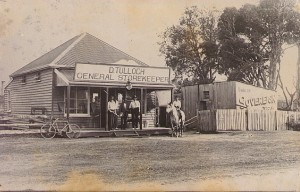 |
That's true. Now Tulloch Store. Now old Dave Tullock. In Yamba Yesterday it mentioned that it closed in 1928 well it was way into the 30s when Dave Tulloch Store closed the reason I know this was because I use to go after school as a seven year old. And he had a black mare, a black horse that he use to drive in the sulky. Do you remember that? And I use to be able to sit up in the sulky with him and I thought I was just great and go around Yamba with this beautiful black horse you know out in front so and rather tragically his daughter was burnt alive in the store. See they use to bottle all their metho and kerosene in those days and he would buy it bulk and bottle it in the store out at the side which is in the photograph at Tulloch Store it shows it. I don't know whether the light fell over, oh, there would have been fumes, covered in fumes and of course or somebody came in and lit a match and of course the next minute, yea... and that was a real tragedy.
Trevor: It was there when the hotel burnt down.
That's right, yea that's right and that was '33. Their old home was on the corner where the Chinese restaurant is now, Henry's and every Monday morning Mrs Tulloch the whole garden yard would be filled with washing.
Trevor: Nobody could beat Mrs Tullock getting the washing on the line. Mum... they would be getting moving on Sunday night and before, you could look straight down there, Mrs Tulloch would have it on the line.
It was well known in Yamba.
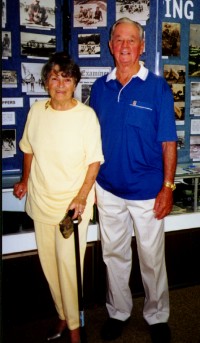 |
Marjorie: "She must have got up before the dawn".
Yea, before the dawn.
Stuart Lee: "He was the JP and when everyone got drunk he would have a trial.
Trevor: In one of those photos there in front of Tullock's Store, those people, those wise old men sitting there you will see one old guy there with a white coat on there hat was actually Charlie Phillips my grandfather.
Talking about that. As children you would wonder why you would walk down the street... the old men would be sitting on seats nattering. Do you know about two months ago I ran into Don Kirk and then somebody else came along and there was about four or five of us sitting on the seat and I thought "Oh my god"!
Trevor: I mention this to Chris Galuptis (Maclean Shire Mayor) that he should put a few seats around because where I noticed that last year in Tasmania all the old guys have got a seat where they can have a bit of a natter.
Now that just a little thing, now again up on the hill as I said Trevor's place was the place to be. As you are all well aware Trevor's entire well aware father was just so instrumental in so many things happening in Yamba. He was a legend in his own lifetime.
Now Craigmore. Craigmore and The Ritz as children growing up, that was the particularly at Christmas time and the holiday periods was the place to be. They had the most marvelous parties I believe on the verandah overlooking the ocean. Old Jim MacDonald was known all over the place for his fish, the batter, his beer batted fish and yeah that used to be really jumping. Archie Cook who was a brother-in-law of Jim MacDonald, their place was more sedate, The Ritz. But it was still... those two places they were guest houses and they were the place to be for all the people who came from Grafton and the property owners and so forth. And of course in front of them in Flinder's Park, that as you will see in the old photograph was just all full of tents and that was our main camping ground. Oh yeah, that was the main camping ground in Yamba and of course the sandhills... as kids we use to slide down the sandhills that were right at the tennis court, that was just steep sand and the rest was just all rolling sand and Honey Ager, I didn't think he got the recognition he should have in Yamba because he was the one that actually saved Yamba, had that sandhill not been stopped it would have been up to the pub (Pacific Hotel) by now.
Marjorie: Yes, we have the whole Honey Ager story.
Yeah, yeah, I knew him and as a matter of fact I use to go out and give him a hand to shift the hessian when the wind changed and he was known as Honey and everybody thought he was mad but just the work that he did up there well it (saved the town).